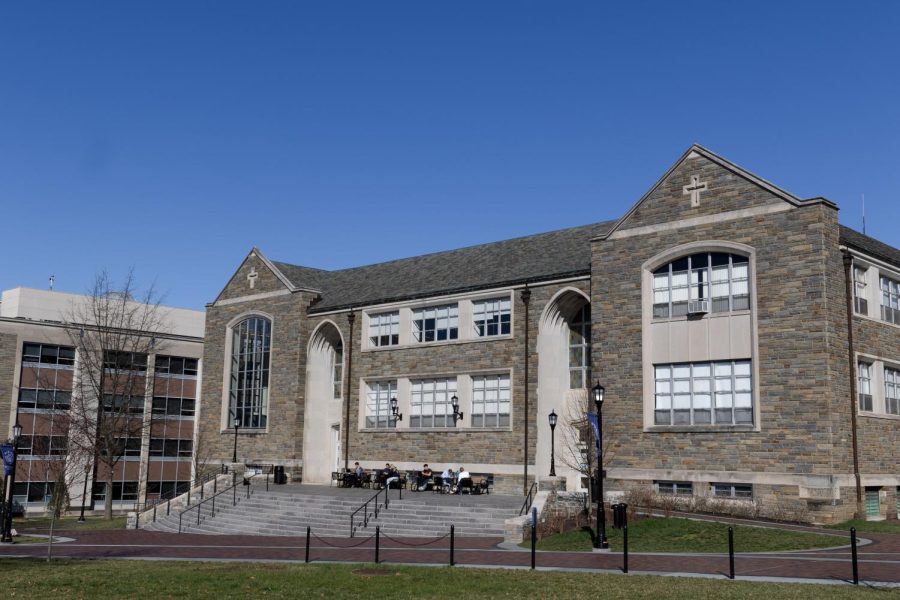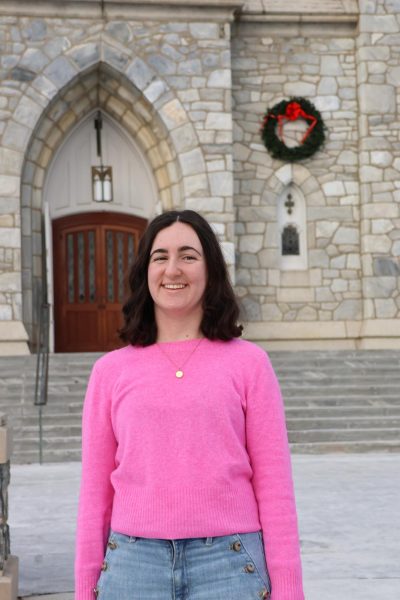Award-Winning Irish Authors Converse at “Writers and Editors, Ethics and Craft” Event
Ryan Sarbello/ Villanovan Photography
The craft event was hosted at Falvey Memorial Library.
April 26, 2023
Acclaimed writer and editor Lisa McInerney flew from Galway, Ireland to Philadelphia last Tuesday to hold a lively conversation with 2023 Irish Studies Heimbold Chair Mary O’Donoghue on the topics of writing, editing and translation.
“Writers and Editors, Ethics and Craft” took place at 4 p.m. on April 19th in the Falvey Library Speaker’s Corner. The event was presented by the Center for Irish Studies and was co-sponsored by the Villanova Writing and Rhetoric Program and Falvey Library.
“A literary event like this not only highlights Villanova’s intimate ties to Ireland through the prestige of the Charles A. Heimbold Jr. Chair of Irish Studies, but offers the Villanova community the enriching experience of closely learning from and dialoguing with some of Ireland’s finest minds,” Center for Irish Stuxdies Acting Director Jennifer Joyce said.
Joyce introduced the speakers during her opening comments.
O’Donoghue, selected by the University as the 2023 Heimbold Chair for the spring semester, is the author of the novel Before the House Burns (The Lilliput Press, 2010) and the poetry collections Among These Winters (Dedalus Press, 2007) and Tulle (Salmon Poetry, 2001). O’Donoghue’s latest short story collection will be published this summer in the Irish literary magazine The Stinging Fly, of which McInerney was appointed editor in 2022.
Apart from editing, McInerney is the author of three novels: The Glorious Heresies, The Blood Miracles and The Rules of Revelation. She is also the winner of the Women’s Prize for Fiction and published in eleven languages.
O’Donoghue initiated the conversation with an anecdote to address the often tense relationship between writers and editors, describing a preferable dynamic as one characterized by mutual trust.
“The job of an editor is ideally undefined and open, depending on each writer’s individual talents, needs and integrity,” O’Donoghue said.
The speakers then led into a discussion of The Stinging Fly literary magazine, which was featured in a New York Times story earlier this month. McInerney discussed her vision for the magazine, including its mission to publish a diverse range of work from new writers and reflect what is currently happening in Ireland.
O’Donoghue and McInerney also spent time exploring the ethics of literary editing and the characteristics of a good editor as someone who a writer can both trust and expect to refine a work to better fulfill its vision.
“I feel almost cheated when I’m not pushed by an editor,” McInerney said. “The editor’s role isn’t dictatorial and should feel like a second champion of the work, advocating for the story as its own separate entity.”
O’Donoghue followed this idea by emphasizing the importance of rewriting not as an attempt to “fix” a piece of writing, but rather, as a process of discovery and continuous improvement upon existing ideas.
“A work is never finished, only abandoned,” McInerney said.
O’Donoghue and McInerney then allowed audience members to ask questions. Topics included the role of cover art in complementing a piece of writing, the process of translating works between English and Irish, and advice on starting a new piece and defeating writer’s block.
“The blank page is the worst thing in the world, but nobody else has this idea, so it’s your responsibility to get it into the world,” McInerney said, noting that she is currently working on her fourth novel.
The conversation’s focus on the craft of writing and the ethics of editing brought in the attendance of numerous students involved in the Writing and Rhetoric Program, which takes the form of either a concentration or a minor.
“The value of an event such as this is that it shows the scope of the program,” Ellen Bonds, professor in the program, said. “Although English and Communication are the two main departments that sponsor the program, there’s so many connections. This particular connection is Irish Studies and literature.”
O’Donoghue and McInerney’s conversation will also be available as a Center for Irish Studies podcast on YouTube, Apple Music and Spotify.
“The Conversation with the Heimbold Chair event brings Irish Studies to life for the community,” Joyce said.
The interdisciplinary event proved a valuable experience for all those in the audience, whether interests in writing, Irish Studies or both drew them to the conversation.



